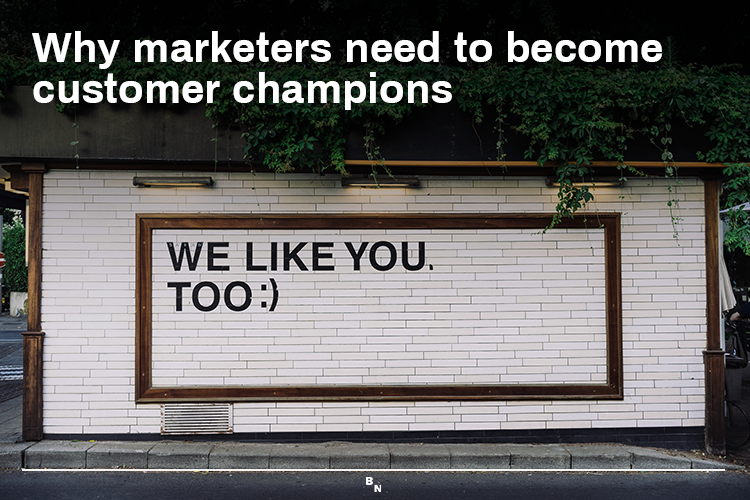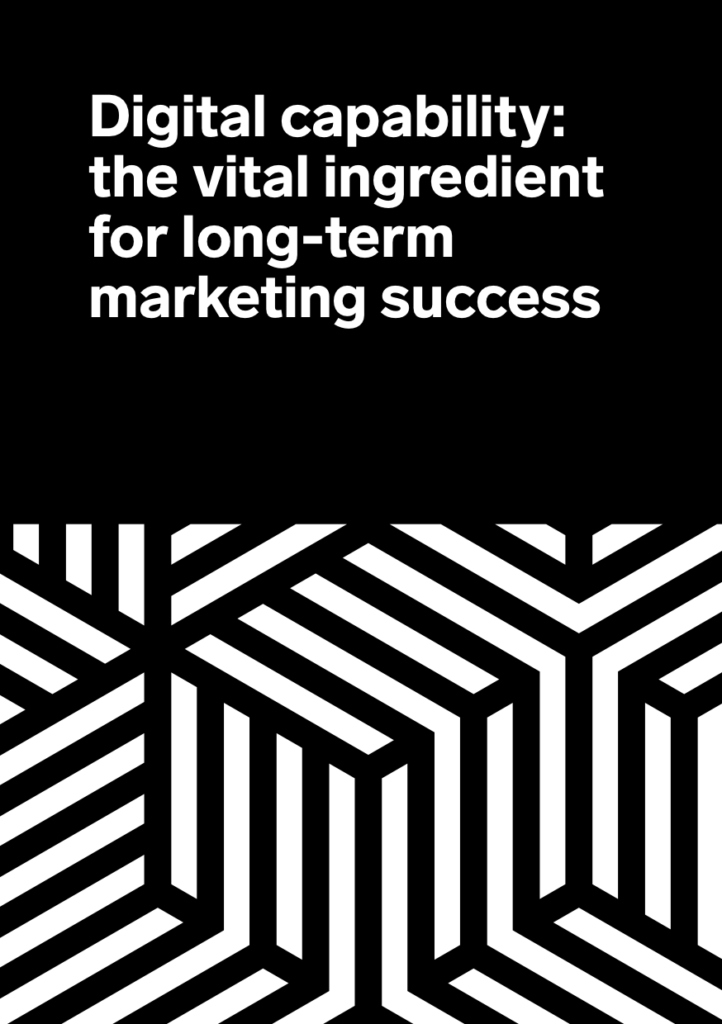We all know that technology is creating a fundamental change in customer expectations and business processes. In this month’s Brilliant Reads we explore the elements of effective marketing capability programmes and why they’re essential for your organisation. For marketing teams to succeed, there must be change.
What is marketing capability? Marketing capability is the ability to market effectively in our ever-changing digital world and change the way your team thinks and works in a digital context. To do this you must focus on these four elements:
- Mindset
- Behaviour
- Skills
- Experience
To stay ahead of the curve longterm, smart marketing leaders are investing in human-centred transformation. They aren’t just putting consumer data and insight at the core of their organisation; they’re equipping their people to act on it in brave and creative ways.
We’ll explore the four factors of marketing capability we touched on above. Including the need for collaboration between sector experts and marketing practitioners, and how a growth mindset can transform your team’s thought process.
What makes a successful marketing capability programme?
Marketing capability is a vital ingredient for long-term success. Ambitious companies are growing their marketing people: how they think, what they do and how they do it. We’ve been helping our clients do this since 2011 – working with brands as diverse as Universal Pictures, TUI Group, Barilla, American Express, adidas and Diageo.
In our marketing capability programmes, we focus on four factors to achieve success –
- Creating a digital mindset
Mindset is the most important element when it comes to an organisation’s ability to reinvent itself. If you want to reinvent the future, start with how people think – not what they know. A digital mindset is a growth mindset. It’s a way of constantly challenging our businesses and ourselves; a way of thinking critically and striving to do things better. Without this, no matter how many skills your people learn, they’ll do what they’ve always done. - Embedding new behaviours
A growth mindset results in new behaviours. Firstly, define the behaviours you want to create. How do they fit with existing values and principles communicated throughout the business? Then look for the bright spots – examples of where they’re already being demonstrated. Recognising and celebrating these behaviours will make the change tangible to everyone. Telling stories around the impact of these behaviours is a powerful way to inspire others to follow suit. - Building skills
Improving digital skills isn’t the silver bullet to building capability that many think it is, but it is important. Everyone needs a base level of knowledge to create a shared language around change, even if not everyone will be practically applying the more advanced digital skills. - Creating developmental experiences
Now to create a space for people to experiment with new behaviours and skills; a digital mindset needs exercising if it’s to become a habit. Without a safe environment, people won’t challenge because they won’t feel empowered to. They won’t take risks, because they’ve seen the price of failure. Above all, they won’t innovate. Our capability programmes create opportunities for people to quickly apply their new-found digital mindset, behaviours and skills within agile innovation sprints and pilot initiatives.
Digital capability: the vital ingredient for long-term marketing success – Brilliant Noise – 8 mins
Encourage a growth mindset
Your people’s mindset is crucial to achieving success for the organisation. Collaborating and developing your people is the key to changing the processes your team follows.
Marketing capability is essential when you find your teams are stuck in a rut. Working in silos and failing to collaborate with departments outside of their immediate circle.
To create long-term change in your organisation, you need to encourage a growth mindset in your team. An openness to learn new things is crucial to achieving great things even if it leads to a few pitfalls along the way.
As well as your team’s mindset, you must remember to develop your own too. Try resetting your inner dialogue to a supportive one and celebrate what you and your team have achieved to date. Organisationally, develop frameworks through which your team can test and learn without retribution. By doing this, you’ll develop a growth mindset and help create a safe environment so the team can share creative concepts with their peers.
Changing how we feel about change – Brilliant Noise – 4 mins

Upskill your teams
Although hiring outsiders can bring new ideas, remember not to lose focus on your existing teams. You need to make sure there is a changemaker to reach and inspire your people. Here are four ways you can drive impact:
Give your team a reason to care
Use your position and most importantly your voice to get your message out to your team. Position yourself as a pillar of inspiration, sharing your vision on the exciting future ahead for your team and the organisation. Share earlier success stories with your team to inspire them to get on board with the journey of change.
Give them the tools to build success
Once you’ve inspired your team – what next? You need to ensure that your team’s equipped with all the tools they need to achieve the vision for your company. This could be promoting specific training events or courses, sharing links to tools, tips and user guides, or setting up discussion groups.
Support them to make their ideas a reality
The team are skilled-up and ready to go – now it’s time for you, the changemaker to encourage their ideas and transform them into a reality. Create opportunities for your team and identify people from different backgrounds and experiences to work together to skill swap and put their new learnings into practice. Create a strong communication channel for you and your team to collaborate. By doing this you encourage communication to flow between peers, not just from the top down.
Maintain this approach to achieve long-term change
Maintain consistent momentum in your change programme to achieve long term change. Although it can be challenging to keep morale up at all times – as a changemaker, your energy will influence your team to stick to your new process and inspire them to continue to work towards the goals put in place. The result of this support and energy will be more changes in day-to-day behaviours, more pilots, and ultimately more business impact.
From inspiration to action – Brilliant Noise – 3 mins
Recruit for mindset, not sector.
One way to provoke change is to hire marketers regardless of their experience within a specific sector. Bringing in marketers who think differently can bring a new lease of life to the team. A fresh perspective can be the deciding factor that sets you apart from competitors.
Pair this with passion – and you’re a force to be reckoned with. Some marketers specifically seek out opportunities in different sectors to challenge themselves. This tenacity is admirable and a valuable element to forming long-term change.
A recent example of this is the arrival of Michelle McEttrick at Tesco as Group Brand Director, coming over from Barclays. She hadn’t worked in the retail industry before her position, yet had demonstrated her marketing expertise in other sectors.
McEttrick says, “I am very comfortable moving between sectors without having sector experience, as long as I have deep experience of the functional need. Then I think the question is whether you can apply that functional experience effectively within the organisation”.
Pairing the functional skills and experience with sector experts can broaden your team’s capability and contribute towards developing an agile and efficient approach to marketing in your organisation. This leaves the marketing practitioner to map out clear, well-designed objectives and goals and a method for achieving them will lead to success.
The benefits of being an outsider – Marketing Week – 2 mins
Conclusion
We live in a time where marketing teams need to step up or step out. Innovation is repeatedly jeopardised by outdated processes and mindsets. Change has never been more disruptive than it is today, so building marketing capability is key to securing long-term success.
By investing in all four elements of marketing capability – mindset, skills, behaviours and experience you can work towards a clear, inspiring vision that speaks directly to people’s needs and motivations.
You can read more about how we can help you develop the right mindset, behaviours and skills to create the experiences that will deliver rapid change by downloading our Digital Capability whitepaper below –
[hubspot type=form portal=5554216 id=4d753457-e233-478f-a0f0-8ab7db9216f9]

